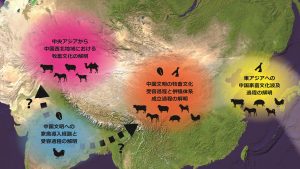B01:Exploring the Dynamism of Eurasian Domestic Animal Cultures through Zooarchaeological Studies
Aiming to Propose a New Historical Perspective of Eurasian Livestock Culture |
|
| Hiroki KIKUCHI (Kanazawa University) |
The “etiquette system” is deeply engrained as a norm for manners and ceremonies in the social order and institutions that surround us today, from the state’s to an individual’s behavior. The etiquette system, a centripetal element in the formation of the ancient East Asian world, played a core role in the establishment of Chinese civilization.
To maintain this etiquette, a ritual system based on the sacrifice of six domestic animals (cattle, horses, sheep, pigs, dogs, and chickens) was essential and functional. The establishment of this sacrificial system of livestock and poultry was triggered by the acceptance of Central Asian pastoralism in the late Neolithic period, from the late 3rd millennium BC to the early 2nd millennium BC, and was achieved through a process of the various elements of Neolithic culture that had emerged throughout China converging into the Middle Yellow River region.
In this study, we are planning to focus on the acceptance of pastoral culture in Central Asia and the integration of various cultural elements in the late Neolithic period in China, which played a role in the formation of Chinese civilization, deriving these two major historical dynamics from practical zooarchaeological studies of animal remains excavated from archaeological sites. We will also examine the role that unique Chinese pastoral culture, which was triggered by the acceptance of foreign pastoral cultures, played in the formation of Chinese civilization, as well as the significance of species selection and the changes in cultural implication as it spread and expanded to the surrounding world.
By doing so, we aim to propose a new scenario for the history of Eurasian livestock culture. This will provide a new perspective for the study of the history of East-West exchange and the history of livestock culture by examining the unique pastoral culture that developed in Chinese civilization through a series of processes, from acceptance and development to propagation.
Members
| Principal investigator | Hiroki KIKUCHI | Kanazawa University |
|---|---|---|
| Co-investigator | Masaki EDA | Hokkaido University |
| Masashi MARUYAMA | Tokai University | |
| Saiji ARAI | The University of Tokyo |


